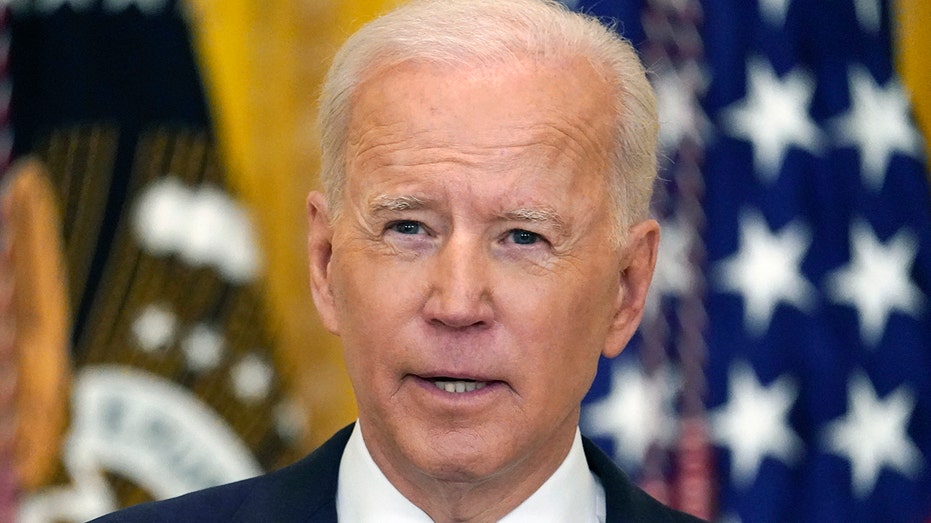Biden to unveil multi-trillion dollar infrastructure plan in Pittsburgh next week
President's infrastructure bill is expected to include tax hikes on wealthy Americans, corporations
Biden on infrastructure plan: Want to create ‘really good-paying jobs’
President Biden discusses his upcoming infrastructure plan in his first news conference.
President Biden said Thursday that he will travel to Pittsburgh next week to announce details of his multitrillion-dollar infrastructure bill, a sweeping measure that's expected to include funds for roads and bridges, as well as address issues like climate change and income inequality.
"The next major initiative is – and I'll be announcing it Friday in Pittsburgh in detail – is to rebuild the infrastructure, both the physical and technological infrastructure of this country so that we can compete and create significant numbers of really good-paying jobs," Biden said during his first official White House press conference.
White House press secretary Jen Psaski said Wednesday Biden would provide more details about the proposal on Wednesday, March 31, in Pittsburgh.
YELLEN SAYS HIGHER TAXES NEEDED IN LONG TERM TO FINANCE US SPENDING
The specific contours of the next big-ticket spending package are still unclear, but the measure is widely expected to include a slew of taxes hikes, including raising the corporate tax rate to 28% from 21%, increasing the income tax rate on individuals earning more than $400,000, expanding the estate tax, creating a higher capital-gains tax rate for individuals earning at least $1 million annually and paring back tax preferences for so-called pass-through businesses.
An analysis of Biden's tax plan conducted by the Tax Policy Center estimated it would raise $2.1 trillion in new revenue over a decade.
BIDEN WANTS TO RAISE TAXES ON AMERICANS WHO GOT RICHER DURING PANDEMIC
The measure could cost upward of $3 trillion, according to The Wall Street Journal. The White House is expected to break up the legislative effort into two main components: One focused primarily on infrastructure and clean energy investments, and a second centered on issues like child care and universal pre-kindergarten.
The tax hikes are expected to be similarly divided; the infrastructure part of the bill would be funded by taxing corporations, including raising the corporate tax rate to 28%, increasing the global minimum tax paid from about 13% to 21%, ending federal subsidies for fossil fuel companies and forcing multinational companies to pay the U.S. tax rate rather than the lower rates offered by foreign subsidiaries, The Washington Post reported on Monday.

President Joe Biden speaks during a press conference in the East Room of the White House, Thursday, March 25, 2021, in Washington. (AP Photo/Evan Vucci) ((AP Photo/Evan Vucci))
The second part of the legislation focused on domestic priorities, meanwhile, would be paid for by increasing the highest income tax rate from 37% to 39.6%, raising taxes on wealthy investors and limiting deductions that rich taxpayers can claim annually, the Post reported.
GET FOX BUSINESS ON THE GO BY CLICKING HERE
The proposals largely mirror what Biden campaigned on during the 2020 election. He has repeatedly said the tax hikes will not affect Americans earning less than $400,000 per year.
But the tax proposals are almost certain to spur criticism from Republicans, as well as some moderate Democrats who are wary of raising tax rates while the economy is still recovering from the coronavirus pandemic.
Senate Minority Leader Mitch McConnell, R-Ky., said last week that there will not be bipartisan support for such a move, and the Chamber of Commerce has warned that raising the corporate tax rate would "make the United States a less attractive place to invest profits and locate corporate headquarters."
CLICK HERE TO READ MORE ON FOX BUSINESS
The infrastructure bill comes just a few weeks after Biden signed into law the $1.9 trillion American Rescue Plan. Congress had already approved close to $4 trillion in coronavirus relief measures under former President Donald Trump, pushing the deficit to a record $3.1 trillion in fiscal year 2020 — which doesn't include the $900 billion relief package lawmakers approved in December.
The national debt is poised to hit $30 trillion by the end of the year.





















